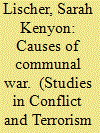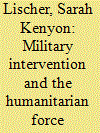|
|
|
Sort Order |
|
|
|
Items / Page
|
|
|
|
|
|
|
| Srl | Item |
| 1 |
ID:
077772


|
|
|
|
|
| Publication |
2007.
|
| Summary/Abstract |
Violent conflict causes millions of people to flee their homes every year. The resulting displacement crises not only create logistical and humanitarian nightmares, these crises threaten international security and risk the lives of displaced people, aid workers, and peacekeepers. Despite the dangers posed by conflict-induced displacement, scholars, policy makers and international organizations usually have only a partial understanding of these crises. Conflict-induced displacement consists of two main factors: 1) The violence that caused the displacement and 2) The characteristics of the resulting displacement crisis. Many observers fail to disaggregate each factor; rather lumping all types of violence together or viewing displaced people as an undifferentiated mass. This paper demonstrates that disaggregation of both concepts-causes of conflict-induced displacement and characteristics of a crisis - is necessary to understand fully the importance of displacement in international politics. The paper develops typologies to analyze those concepts and discusses the implications for future research on conflict-induced displacement.
|
|
|
|
|
|
|
|
|
|
|
|
|
|
|
|
| 2 |
ID:
066069


|
|
|
| 3 |
ID:
155233


|
|
|
|
|
| Summary/Abstract |
In addition to being a tragic output of civil war, large-scale displacement crises often become enmeshed in the politics, security, and economics of the conflict. Refugee and internally displaced populations thus exacerbate concerns about regional destabilization. The Syrian refugee crisis, for example, is deeply entwined with civil and international conflict. Neighboring host states of Turkey, Jordan, and Lebanon bear the brunt of the crisis, while European states seek to prevent further encroachment by Middle Eastern asylum seekers. Policy-makers often mistakenly view host state security and refugee security as unrelated–or even opposing–factors. In reality, refugee protection and state stability are linked together; undermining one factor weakens the other. Policies to protect refugees, both physically and legally, reduce potential threats from the crisis and bolster state security. In general, risks of conflict are higher when refugees live in oppressive settings, lack legal income-generation options, and are denied education for their youth. The dangers related to the global refugee crisis interact with many other threats that emanate from civil wars and weak states, such as fragile governments, rebel and terrorist group activity, and religious or ethnic fragmentation.
|
|
|
|
|
|
|
|
|
|
|
|
|
|
|
|
| 4 |
ID:
179430


|
|
|
|
|
| Summary/Abstract |
Drawing on my field research experiences in Rwanda, Bosnia, and Cambodia, I present a personal narrative that creates a vivid picture of field research in challenging environments and contemplates what research ethics look like in post-genocide societies. Working in violent, traumatized, or oppressive conditions reveals the fragility of traditional political science methods when confronted with the realities of human suffering. Part of the intrinsic value of field interviews is the unique interactive experience between researcher and respondents, which can never be fully replicated. Addressing the controversies about research methods, I argue that the Data Access and Research Transparency (DA-RT) versions of protection, replicability, and transparency undermine the integrity of field research and can threaten the security of researchers and respondents. This article also reflects on the personal experience of working in three post-genocide societies, including the effects of trauma and empathy. Despite the difficult subject matter and personal challenges, I continue to champion field research for the unmatched understanding it offers researchers. This reflection encourages a broader discussion about the value of human interaction in the research process, even if those interactions do not fit neatly into a methodological template.
|
|
|
|
|
|
|
|
|
|
|
|
|
|
|
|
| 5 |
ID:
077057


|
|
|
| 6 |
ID:
168877


|
|
|
|
|
| Summary/Abstract |
After a genocide, leaders compete to fill the postwar power vacuum and establish their preferred story of the past. Memorialisation, including through building memorials, provides a cornerstone of political power. The dominant public narrative determines the plotline; it labels victims and perpetrators, interprets history, assigns meaning to suffering, and sets the post-atrocity political agenda. Therefore, ownership of the past, in terms of the public account, is deeply contested. Although many factors affect the emergence of a dominant atrocity narrative, this article highlights the role of international interactions with genocide memorials, particularly how Western visitors, funders, and consultants influence the government's narrative. Western consumption of memorials often reinforces aspects of dark tourism that dehumanise victims and discourage adequate context for the uninformed visitor. Funding and consultation provided by Western states and organisations – while offering distinct benefits – tends to encourage a homogenised atrocity narrative, which reflects the values of the global human rights regime and existing standards of memorial design rather than privileging the local particularities of the atrocity experience. As shown in the cases of Rwanda, Cambodia, and Bosnia, Western involvement in public memory projects often strengthens the power of government narratives, which control the present by controlling the past.
|
|
|
|
|
|
|
|
|
|
|
|
|
|
|
|
| 7 |
ID:
083704


|
|
|
|
|
| Publication |
2008.
|
| Summary/Abstract |
Since the 2006 bombing of the al-Askari Mosque, 4.5 million Iraqis have fled their homes, and displacement has become a central strategy in the civil war. Militant groups have engineered these colossal population movements to consolidate their power and expand their territorial claims. As this crisis demonstrates, displacement can expand and intensify violence during a civil war. In addition, refugee flows increase the risk that conflict will spread across international borders. In some cases, refugee militarization can lead to international war and regional destabilization. Even if the displaced Iraqis do not join militant groups, their mere presence will exacerbate political tensions. To prevent the wide-scale militarization of the displaced Iraqis, donors and host states should heed the following policy recommendations. First, provide a massive infusion of humanitarian aid. Second, resist the temptation to build camps to house the displaced. Third, do not return the displaced people home against their will. Fourth, expand and expedite the resettlement process, especially for vulnerable Iraqis such as those who were once coalition employees.
|
|
|
|
|
|
|
|
|
|
|
|
|
|
|
|
|
|
|
|
|